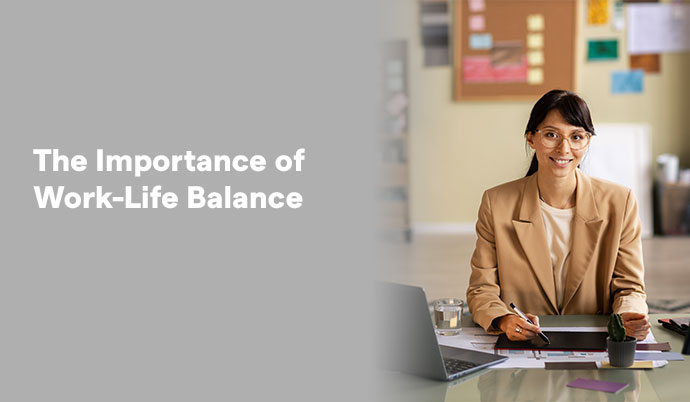
Work-life balance refers to the equilibrium between professional responsibilities and personal well-being. It is not about equal hours spent at work and home, but about the sense of harmony and satisfaction one derives from both spheres. For some, it may mean flexible working hours; for others, it could be the ability to disconnect from work after office hours to spend time with family or pursue personal interests.
According to the 2023 Work-Life Balance Global Report, only 12% of Indian professionals feel they have an excellent work-life balance, while 58% of them say they work for 48 hours. Globally, according to some polls, 60%+ of workers say that their job is the number-one factor in preventing them from spending quality time with family.
In a world that glorifies hustle and constant productivity, the concept of work-life balance often feels like a luxury rather than a necessity. Yet, as burnout, stress, and emotional exhaustion become increasingly common, striking a healthy balance between professional duties and personal well-being is more important than ever. Work-life balance is not just about time management; it’s about creating space to live fully, both in and outside of work.
So, do we know the root cause of the problem?
Work and life balance sheets have become more talk than action in an era of side hustles, remote jobs, and all "rise and grind" like things. But here's the catch: burnout strikes you faster than an energiser-free Monday when you neglect work-life balance. The consequences of neglecting work-life balance extend far beyond feeling "tired" or "busy." One of the most serious outcomes is burnout, a psychological state recognised by the World Health Organisation as a result of prolonged workplace stress. Psychologically, when individuals are unable to rest and restore, their nervous system remains in a constant state of activation. This “fight-or-flight” mode eventually leads to physiological wear and tear and makes the individual dysfunctional and dysregulated.
Hence, let's deep-dive into this matter and shine a spotlight on why prioritising work-life balance has become most important.
Burnout is not just a fancy term for tiredness. It is a serious mental health issue recognised by the World Health Organisation, characterised by chronic workplace stress that has not been successfully managed. The symptoms of burnout include:
If you allow yourself to constantly burn the midnight oil, skip lunches, or wake up tired even after eight full hours of sleep, it might mean that your body has bigger problems to say. Research reports from the American Psychological Association state that employees with burnout status are 63% more likely to take a sick day and 23% more likely to visit the doctor frequently. So yes, that means burnout doesn't just cause poor performance; it can impair physical health, damage relationships, and deteriorate happiness in life.
Ironically, many people work overtime in the name of efficiency, but science suggests otherwise. It sounds somewhat paradoxical, but according to the Harvard Business Review, companies that encourage a healthy work-life balance see a 25% increase in employee productivity and a decrease in turnover. Why? Employees who are well-rested and refreshed get more creativity and focus, have higher emotional intelligence, and can quickly solve complex issues and work well together. It is like charging your phone: If you never plug it in, it will die eventually. Fostering a work and life balance culture means recognising the importance of life beyond productivity metrics and late-night Zoom calls. Individuals who prioritise this are better at problem-solving, teamwork, and decision-making, skills that are critical in most work environments.
Individuals must take into consideration that work life cannot love you back. A raise or a hike in pay might feel nice, but they do not amount to actual time with family, friends, or even just your beloved dog. We start losing out on relationships that nourish our sense of belonging and happiness in life when we are stuck in a whirl of work. When work takes precedence over all else, it often comes at the cost of meaningful connections. Friends, family, and even our own emotional needs begin to fade into the background. This can lead to feelings of loneliness, disconnection, and dissatisfaction, even in high-achieving individuals, as reviewed by the best psychiatrist hospital in Delhi.
In fact, according to a Gallup study conducted in 2022, workers who had strong personal relationships and supportive social lives were twice as likely as others to say that they derive high levels of satisfaction from their jobs, and this was irrespective of the number of hours they worked. Emotional well-being does not exist just inside the confines of work; it lies deep inside of how fulfilled we feel outside. So, in essence, skipping dinner with your significant other for a Zoom meeting is not something one should really be bragging about. Work-life balance fuels happiness in life by allowing space for meaningful connections.
Stress is not something mental; it is physical. Long-term work-life-related stress has been associated with hypertension, heart disease, anxiety disorders, and even diabetes. The International Labour Organisation (ILO) reports that prolonged working hours are now considered the biggest work-life health hazard, with over 745,000 deaths each year across the globe. All those extra hours at work? They're not only consuming your time, but maybe cutting years off your life. When you make room for hobbies, rest, and self-care, you're making an investment in your happiness in life. You're saying, "Hey body, I've got your back." And trust me, your future self will appreciate those evening strolls or yoga sessions a lot more than overtime marathons at work. These are not indulgences, they are necessities rooted in the importance of life and work and life balance.
This is the big picture: it's not merely individuals attempting to balance better. It's about transforming how work-life environments are designed. Businesses that actively promote flexibility, honour personal boundaries, and celebrate time away from work are not being nice, they're being smart. Increasingly, Gen Z and millennial employees are consciously opting for purpose and self-improvement over mere paychecks. Indeed, 65% of workers job hunting in 2024 would reject a high-paying job if the work-life balance was bad, a Glassdoor survey revealed. So yes, work-life balance isn't a luxury; it is the new standard. And if your employer doesn't get that memo soon, they're going to be ghosted faster than a boring Hinge date.
How Do You Start Finding That Balance?
Let's get real: not every single one of us can quit their job and go to a vacation to Goa to spend their days writing poetry on the beach (although we all dream about it). But even tiny changes can lead to huge ones. Individuals who set boundaries, prioritise self-care, and engage in leisure activities are found to enjoy better mental and physical health, live longer, and report a higher sense of meaning and satisfaction in life.
Work-life balance is not just a personal responsibility; it is a systemic issue. While individuals can take steps to protect their time, organisations and societies must create environments where balance is possible. Flexible working hours, mental health days, respect for personal time, and non-toxic work cultures are no longer luxuries; they are essential to retain talent and prevent burnout.
In the end, work-life balance is not just about managing time; it’s about honouring your well-being, protecting your relationships, and living in alignment with your values. It is a dynamic process, not a perfect equation, and one that requires conscious choices each day. As we collectively move toward a culture that values mental health, emotional fulfilment, and sustainable productivity, let us remember that true success is not measured by how much we achieve at work alone, but by the quality of life we create beyond it. Because a well-lived life is the most meaningful legacy of all.
Work-life balance is not a place where you end up with a margarita in your hand and an "I've made it" attitude. It's more like yoga, a stress-free pursuit of your hobbies, and is constantly a work in progress. You'll get it right some days and blow it on others. And that's just fine. The mission is straightforward: don't let your work take away your work life, take away the happiness in life you're fighting so ardently to create. Hustle, for sure, but remember to inhale. Be productive, yes, but rest too. Labour hard, certainly, but live harder. Because at the end of the day, your life story needs to be better than a résumé. For a stress-free session and psychology-related diagnostic care and treatment, book an appointment at Sir Ganga Ram Hospital today.




